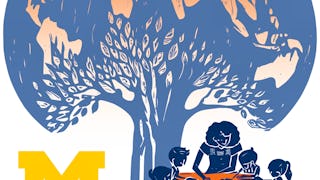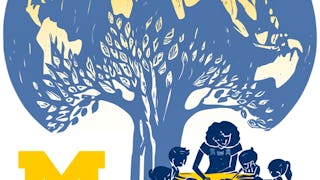Discover what shapes how we talk about schools today by exploring the history of U.S. education reform. Engage with the main actors, key decisions, and major turning points in this history. See how social forces drive reform. Learn about how the critical tensions embedded in U.S. education policy and practice apply to schools nationally, globally— and where you live.



American Education Reform: History, Policy, Practice


Instructors: Dr. John L. Puckett
13,029 already enrolled
Included with 
(110 reviews)
(110 reviews)
Skills you'll gain
Details to know

Add to your LinkedIn profile
8 assignments
See how employees at top companies are mastering in-demand skills


Earn a career certificate
Add this credential to your LinkedIn profile, resume, or CV
Share it on social media and in your performance review

There are 8 modules in this course
This module looks at the sources of education in Colonial America; factors that motivated the acquisition of literacy in the colonies; formal educational institutions of the seventeenth and eighteenth centuries; post-Revolution republican visions of free public schools; characteristics of elementary schools in the early Republic; and Benjamin Franklin’s Philadelphia Academy.
What's included
8 videos1 reading1 assignment
This module takes up the accelerating market economy between 1815 and 1850; the Second Great Awakening and its spur to social innovations; Horace Mann’s paean for “common” schools; Whigs and the common school movement; Catholic opposition to common schools; the suppression of black literacy in the antebellum South; and nineteenth-century academies.
What's included
8 videos1 reading1 assignment1 peer review
This module considers the post-Civil War expansion of the common school and the reality behind the myth of the “Little Red Schoolhouse”; the educational gains made by blacks during the Reconstruction period and the limits white supremacists put on blacks’ educational progress after Reconstruction; the Hampton/Tuskegee model of industrial education for blacks and the role of northern industrial philanthropists; Plessy v. Ferguson and Jim Crow schooling in the South; the Carlisle Indian School; and the early progress of the American high school.
What's included
7 videos1 reading1 assignment
This module looks at the Progressive movement writ large; the U.S. settlement movement as a source of urban school reform; the changes “administrative progressives” effected in the governance of urban school districts; the influence of the U.S. Army’s World War I intelligence- testing program on the American school system; social efficiency schooling and its theoretical foundations; the Committee of Ten, 1892–93; the Cardinal Principles of Secondary Education, 1918; and Booker T.Washington and W.E.B. DuBois.
What's included
9 videos1 reading1 assignment
This module takes up the major characteristics of Dewey’s Laboratory School at the University of Chicago, 1896–1904; the role of reflective thinking in Dewey’s theory of knowledge; Dewey’s conception of the school as a social center; Dewey’s disengagement from public schools after 1904; William Heard Kilpatrick and the pedagogical progressives’ distortion of Dewey’s theory; and the cornerstones of Dewey’s educational philosophy.
What's included
6 videos1 reading1 assignment
This module looks at the New Deal’s contribution to the education of American youth; the impact of the Great Depression on education; social reconstruction and the schools; schools as social centers, community centers, and community schools; the Nambé School, New Mexico; the Arthurdale School, West Virginia; and Benjamin Franklin High School, East Harlem.
What's included
7 videos1 reading1 assignment1 peer review
This module takes up the Cold War and education; the conservative attack on “life adjustment education”; McCarthyism and the New York City schools; federally sponsored New Curricula, late 1950s–1960s; the “radical romanticists”; the post-Brown struggle for racially integrated schools; the Ocean Hill–Brownsville conflict; and Title IX of the Education Amendments of 1972.
What's included
9 videos1 reading1 assignment
This final module addresses the rise of school choice and charter schools; markers of the evolving (expanded) federal role toward standards and accountability in public schools; significant reauthorizations of Title I of the 1965 Elementary and Secondary Education Act (ESEA); the No Child Left Behind Act (NCLB) of 2002; the critique of charter schools; school district portfolios of school choice; Teach for America and others markers of teaching as a semi-profession; and post-NCLB developments, including Race to the Top, Common Core Standards, and online learning.
What's included
8 videos1 reading1 assignment
Instructors


Offered by
Explore more from History


University of Michigan


University of Geneva


University of Michigan


The University of Chicago
Why people choose Coursera for their career




Learner reviews
110 reviews
- 5 stars
82.72%
- 4 stars
11.81%
- 3 stars
1.81%
- 2 stars
1.81%
- 1 star
1.81%
Showing 3 of 110
Reviewed on Jun 12, 2017
Great course gives a great historical perspective for anyone who teaches.
Reviewed on Jul 30, 2017
Very informative and succinctly gave an overview of education and educational improvements in America.
Reviewed on Mar 3, 2016
Interesting review of American Education Reform. Thanks for providing information on a topic on which I felt uninformed prior to reading and hearing this course.

Open new doors with Coursera Plus
Unlimited access to 10,000+ world-class courses, hands-on projects, and job-ready certificate programs - all included in your subscription
Advance your career with an online degree
Earn a degree from world-class universities - 100% online
Join over 3,400 global companies that choose Coursera for Business
Upskill your employees to excel in the digital economy
Frequently asked questions
Access to lectures and assignments depends on your type of enrollment. If you take a course in audit mode, you will be able to see most course materials for free. To access graded assignments and to earn a Certificate, you will need to purchase the Certificate experience, during or after your audit. If you don't see the audit option:
The course may not offer an audit option. You can try a Free Trial instead, or apply for Financial Aid.
The course may offer 'Full Course, No Certificate' instead. This option lets you see all course materials, submit required assessments, and get a final grade. This also means that you will not be able to purchase a Certificate experience.
When you purchase a Certificate you get access to all course materials, including graded assignments. Upon completing the course, your electronic Certificate will be added to your Accomplishments page - from there, you can print your Certificate or add it to your LinkedIn profile. If you only want to read and view the course content, you can audit the course for free.
You will be eligible for a full refund until two weeks after your payment date, or (for courses that have just launched) until two weeks after the first session of the course begins, whichever is later. You cannot receive a refund once you’ve earned a Course Certificate, even if you complete the course within the two-week refund period. See our full refund policy.
More questions
Financial aid available,

